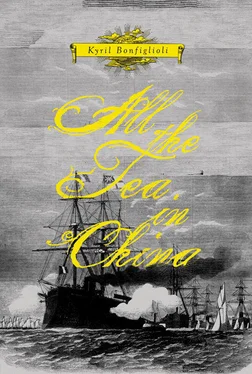The king — or chief — then turned the gun affably in the direction of the fourth youngest elder, who owned one of the most desirable women in the village, and pulled the trigger. There was a shower of sparks from the frizzen but no explosion, of course, for both barrels were now expended. Again, everyone fell into a paroxysm of merriment except the fourth youngest elder, and the chief. The latter scowled at me. I explained that the weapon had to be filled with more magic after each discharge and that this could only be done at the full moon (we were in the first quarter) or on the departure of an honoured and well-feasted guest. The chief muttered like a sulky child, snapping the locks of the rifle petulantly. I was explaining to him that this would wear out the flints when all fell silent, for the distant lokali had stopped speaking and our own hollowed tree-trunk boomed out a response. “ Vroom , da-da, vroom da-da, vroom da-da,” it roared, over and over again. This was not a message, I knew that much; it meant only “I hear you.” Presently an old man crawled into the circle and licked the chief’s feet with every sign of apparent relish. He was older than many of the elders but his position as lokali -talker made him a mere intellectual, a Postmaster-General if you will, or, better, an Oxford don to whom a Prime Minister may listen but must not deign to speak. The chief listened benignly to his mutterings.
Extending his other foot to the pleasing lavage of the old person’s tongue, he told me that the savages down-river had two pieces of news: first, they had heard two great trees snap although there was no hint of thunder; second, at the mouth of the river, a great canoe was lying, longer than a village and with trees growing from it and monstrous pieces of cloth upon the trees.
We collogued. The chief then dismissed the lokali man with a benevolent kick, telling him to talk with the drums up and down the river, saying that he, the progenitor of all elephants, had broken the two trees with his thumb and forefinger out of impatience because the monthly tributes of goats and virgins had not arrived. The second message was to be drummed down-river from village to village: he, whose walls were built of the skulls of those who had displeased him during the last score of scores of years; he who possessed nightly each of his one hundred wives — none thinner than a hippopotamus — bade all the people of the river to guard and cherish his beloved children — to be known by their fiery faces — who would be travelling down-river next day to the great canoe which he, whose very excrement was treasured by all the world, had commanded to appear in the estuary.
This seemed to me a comprehensive laissez-passer but the chief, flushed with the possession of his rifle, wished to make assurance doubly sure. He snapped his fingers and an ancient, dirty person, wearing a necklace of nameless things, crept forward. The chief handed me his own ebony wand and bade me go thrash the god. I followed the dirty old person a few hundred yards into the forest; we entered a stockade inside which there stood an idol crudely shaped from the stump of a tree, sheathed with gold and stuck all over with nails. I belaboured it with the staff until a grunt from the witchdoctor told me that I might exercise compassion. Something else then took place within the stockade which was nasty and which I shall not relate in case your daughters might one day see this narrative.
Blanche had five petticoats left and two pair of drawers. I coaxed one of each from her and that evening used them to purchase a quantity of dance-masks, straw-and-shell skirts, gaily-plaited penis-sheaths and other gew-gaws. I opened my chest of porcelains and took out some of the packing-stuff, replacing it, chiefly on the surface of the chests, with this smelly anthropological trash. Then we went to bed, where I explained to a sulky Blanche that the loss of her drawers was of little importance to a woman with an ardent young husband. I brought her round to my way of thinking at last, for she was not unreasonable.
In the morning, before we set off, the chief came to our giddah and reminded me that it was now meet to restore the magic to his rifle. With many an incantation I poured quite four ounces of powder into each barrel, then a leather wad, two inches of stiff clay, two lead balls, then more clay. He asked for a further supply of powder but I assured him, truthfully, that the weapon as now loaded would last him the rest of his life. I gave him a little paper of priming-powder and adjured him not to discharge the piece until the moon was full. By then I would be on the high seas, you understand. I had never liked the old woman he had shot, but justice must be done, must it not, and savages must be taught not to play with inventions they have not invented for themselves. Nevertheless, I am glad that I was not present when the chief pulled the triggers, for I am a compassionate man and he had been kind to me in his own way.
Indeed, his kindness was not yet exhausted: as our little procession wound down to the river bank, where two capable dug-out canoes awaited us and our goods, a strange and hideous ululation smote our ears. It was somewhat like an Italian tenor practising his scales and gargling with unpleasant medicine at the same time. This sound was intermingled with the merry laughter of little children. Clearly, some farewell entertainment had been arranged for us, for the chief urged us onward with many a nod and smile and hospitable gesture. When the river bank came into view I must confess I was vexed at the mise-en-scène : the fourth youngest elder — he who owned the most desirable wife in the village, you recall — had been tied wrist and ankle and seated upon the point of a five-foot stake planted in the ground. He was not meeting his end with anything of the stoic complacency which is supposed to characterise the Noble Savage; indeed, the hordes of little children were diverting themselves with clever imitations of his antics, encouraged by their admiring mothers.
I applauded politely, for this was clearly expected of me, but I cannot pretend that I found the spectacle at all droll. With the most perfunctory farewells I hurried our party into the canoes. Blanche, I recall, was sick over the side as soon as we were under way: she had probably eaten her breakfast too quickly.
I remember little of our journey down the great river, for, at our first noon-tide pause for food, Blanche and I were persuaded to eat some fresh-water mussels, which grievously afflicted our bowels for the whole of the three days. I recall only the all-pervading, sickly smell as of dead marigolds, the eternity of mangroves and the prodigious number of kingfishers of every size and colour which flashed across our bows like streamers of fire. Yes, and a frightful afternoon when we scorched on a naked sand-bank while a monstrous bull-hippopotamus raved and roared in the shallows, daring us to come into the water and fight with him. My hands shook too much with fever to risk a shot at him, for, had I not hit him lethally with the first shot, he would surely have rampaged ashore and gnashed and trampled us all to death. The canoe-paddlers explained, with many a lewd gesture, that he was in rut.
The last stage of our canoe-journey was through a thick and stinking forest of enormous reeds, following channels which were tortuous and, to me, invisible. I urged the paddlers on with promises of rum, for I was near-frantic at the thought that the ship might sail before we reached the anchorage. When at last we burst out of the reeds onto the open water of the estuary our eyes were blinded by the glare of sky and sea but soon we could descry, at about a mile’s distance, the beautiful, blessed ship: a barquentine and with her sails still furled. I shed some feeble tears of relief.
Читать дальше












